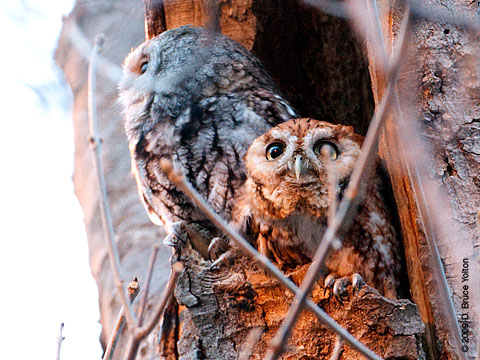I was taught by my parents that when observing wildlife one should do one’s best to avoid disturbing animals. I also learned to never actively interact with them by feeding them or making noises.
One of my best childhood memories is a hike in Grand Teton National Park with my family. I must have been seven or eight and had raced ahead on the trail when I saw a bear. Knowing what to do, I quietly went back up to the trail and told my family. My father found a spot for our family to watch from a distance, and the bear and her two cubs crossed the path and wandered across a meadow for half an hour. I can still remember how wonderful it was to watch the bears and how hard it was to stay quiet!
I’ve been disappointed to learn that some bird watching leaders don’t follow these simple rules. It seems that bird watching tours run for profit can cross ethical boundaries in order to guarantee a successful outing for their paying group.
My first experience with this was while I was a participant in a photography workshop held in Florida by Arthur Morris. Artie compromised standard guidelines for interacting with birds, in order to provide an optimal photographic experience. This included feeding birds with bait, and incredibly, playing Great Horned Owl recordings at a Great Blue Heron rookery.
Over the last few weeks, I have been witnessing another breach of ethics by Dr. Robert DeCandido, Ph.D. He has been giving paid Eastern Screech-Owl tours in Central Park. Instead of studying the owls and leading the tour discreetly through the North Woods in the dark, he actively uses sound recording to manipulate the owls and bring them to a brightly lit roadway.
The owl pair in the North Woods may be the only remaining Eastern Screech-Owls in the park – a gray female from the 2001-2002 releases and a newly introduced young red-phased male.

This is their first year together and tapes, which signal an intruder, agitate them significantly. Dr. Robert DeCandido, Ph.D., a.k.a. Birding Bob, is playing tapes two to three times a week as he leads his tours. He is doing this during their breeding season.
This Thursday night, rather than waiting for the owls to naturally fly out and wake up, Dr. Robert DeCandio, Ph.D. played the recordings too early. Once he had the owls he couldn’t just naturally follow them. He had to loudly play his recording over and over again.
The recordings, which signal an intruder, are highly recommended against by the American Birding Association’s Ethics Guidelines.
What bothers me the most is that Bob usually has inexperienced birders, including children and teenagers, on his walks. He is setting the wrong example. It is not acceptable to manipulate wildlife while observing it for recreation.
In addition, he isn’t teaching them how to be owl watchers. Because of the intrusive methods Birding Bob uses as an owl leader, his tour groups don’t get to witness the fantastic behaviors I’ve seen over the last few weeks, which include fishing, worm hunting, copulation and moth hunting.
So, what to do about this? I don’t know.
Complaints to Bob, by myself and others, haven’t gotten him to stop playing his recordings.
The Parks Department has clear regulations prohibiting harassment of animals in the park. But it is unlikely to respond, since Bob has co-written a paper with senior Central Park Conservancy staff members and has been invited to speak at this year’s On A Wing lectures series.
At this point, I’m just frustrated and yearn for a simpler time, when money didn’t corrupt and boys could learn how to watch bears.